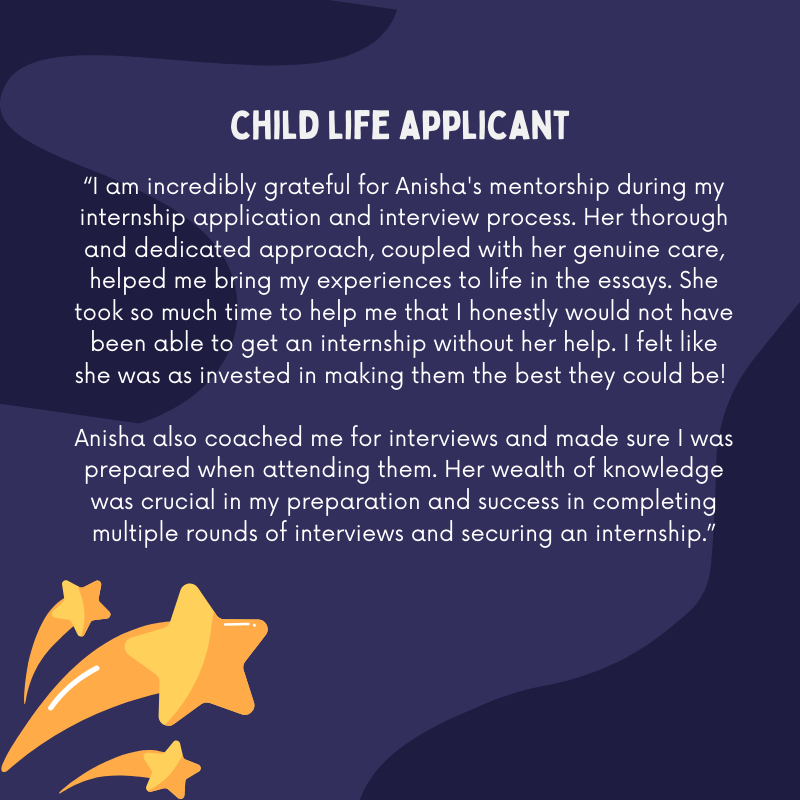My background (more details found at For Students and Student Resources) is in healthcare interviewing. If you're applying to an opportunity as a student or employee, I have found these interview skills below to be key to success. If you're in child life, there's a special section for you at the end!

Be sure you have these tips in your tool belt!
Gimme Questions
Some topics are simply unavoidable and are easy to prepare ahead of time. They're gimme questions because you really shouldn't fumble these if asked. Recruiters might give some variation with the wording, but you can expect to be asked the following:
- Tell me about yourself: Advice for this answer is going to vary tremendously depending on your field. For me: I do a mix of 80% professional, 20% personal. I try for a 3-4 minute answer. They already read about me on a piece of paper, so I truly want to tell them about who I am, what I am passionate about, highlight my unique assets, and where I come from as a person.
- Strengths and weaknesses: I haven't been asked this as much lately, but have 3-4 ready to pull from with corresponding concrete examples to illustrate.
- Describe [fill in the blank]: Whether it's your personality, your work style, your experiences, your skills, your professionalism. Be ready to describe and illustrate them all with concrete examples.
- What makes you a good fit for the role: this one's tough because they have probably heard everything you can think of already if you're applying widely and might not necessarily be passionate about the role you're interviewing for. Cater your answer to the description and skills they are looking for! Remember that they didn't pour over your application materials like you did preparing them. Make sure they know the important stuff!
- How you handle conflict/feedback: never speak negatively of anyone you've worked with or a workplace. Display a growth mindset with your answer and what you learned from the experience.
Practice
I want to emphasize... do not memorize questions and your answers as you prepare. You risk getting stuck or thrown off when it's inevitably asked in a slightly different way. Record yourself and watch it back. Note any vocal tics, pauses, long-winded answers, awkwardness, eye contact. Ask a friend or colleague to do a mock interview with you and give you feedback.
I can help! My services are available to give you individualized guidance and real time feedback. I would be happy to work with you. Check out my background, expertise, and reviews at Student Resources
You'll get a different feel for how the answers flow by actually practicing out loud and in realistic settings (i.e. if it's virtual, set yourself up like you plan to for the interview). Not just rehearsing in your head or taking notes. Being as realistic as possible reveals potential stressors and makes interview day that much more successful. When I was first starting out, I took advantage of every single free mock interview opportunity through school. I hired a coach who dissected my answers and helped me craft stronger answers. Now, I am extremely confident with interviewing because I know myself well and I can deliver answers personably and succinctly. But that was after tons of iterations of answering the same types of questions!
Address Your Weak Areas
Without practice, you won't know what interview skills are lacking. This is where a friend, mentor, colleague, or coach can help you because it can be hard to be disciplined and critique yourself. And without some real interviews under your belt too, it's hard to know what kind of things threw you off or how your body reacted. That's why having ongoing support can be really helpful to see improvement and build your confidence.
Some common problems:
- Blacking out: I had colleagues who would truly not recall anything post interview. Your presence of mind is so important to pivot quickly to questions, adjust your deliveries if you're realizing you're more nervous than you thought, etc. I recommend having a fidget or something to write with to keep yourself focused on the questions. Be transparent with your interviewer if it's okay that you have a blank sheet of paper to take notes.
- Vocal tics, etc.: These can be really distracting to an interviewer and distract from the content of your answers. Self-awareness of your "um"s or "like"s is the first step!
- Long-winded answers: If you feel like you've been answering a question too long, you are definitely well past the point you should've wrapped up your answer. For tough questions, think of how you want to start and how you want to end. Start talking and fill.
- Delivery: Along with succint answers, your tone and facial cues are super important as well. Unenthusiastic, dry answers don't read well even if you're saying all the right things. Be yourself, be confident but gracious, and smile! Show them you're invested in this opportunity, even if the interviewer is remaining stoic and neutral.
- Answering the question: It seems obvious but it's really easy to get off track when you start talking. AND if they ask you the question again after you're done, don't psych yourself out. I've confidently said that was my answer and didn't succumb to pressure to add on some fluff. My most recent time doing that I moved on to the next round so.... Lastly, as mentioned earlier, incorporating stories will impact more than a general overview of your skills. Show your experiences, not just tell.
Level Up
Feel like you've mastered all the above? Know what experiences and skills you didn't have room for on your resumé or didn't feel appropriate to include in your cover letter and be sure to highlight them in your interview somehow. This is the time to show yourself off. For example, when interviewing in child life, I ensured to highlight my background as a career changer from medicine because it's super unique in the field and equips me so strongly to pivot to support a child and family through medical stressors, procedures, or diseases I may not have ever heard of. If I note that an employer has a value that lines up with a significant volunteer experience, I make sure to make mention of it in an answer. It's a more nuanced skill but can really help you stand out. Your ultimate goal is to make sure your skills and experiences are displayed. But wouldn't it be great to leave them impressed? Show yourself off, whatever it takes!
Have Questions Ready for Them
It is simply going to look really bad on you if you don't ask them any questions. I provided advice on this in Interview Basics so check that out. It's really important to ask questions that you genuinely want the answer to. Using any time allotted to ask your interviewer questions is also a huge opportunity to introduce elements you really want to highlight about yourself. I have a few go-to questions that are really important to me personally about a workplace environment that also give me an opportunity to discuss the reason I'm even asking.
For Child Life Applicants
A special section for you!
To date, I have done well over 50 child life interviews as a prospective student and employee.
Applying to Pre-Internships
Questions are directed towards ensuring you have a solid understanding of child life scope of practice, can speak enthusiastically to your direct experiences with children, and can articulate your reasons of preparedness for a child life clinical experience. Know yourself well... your application, your learning style, and your strengths/weaknesses.
Applying to Internships
Questions are more theory-heavy, scenario-based, and overall challenging. With interview processes varying tremendously, you could have....
- a rapid fire 15 minute phone screening
- a 1.5 hour non-stop video questioning by a group in a one-and-done interview
- a 30 minute more casual conversation on the phone or video
- a multi-mini interview where you are rotating with many interviewers
- and more....
But control what you can and the structure isn't one of them. So apply everything I talked about above, speak confidently about the great experiences you've had that taught you a skill that transfers to child life, stay organized, and rest in between. Interview season is tough whether you're getting a few or tons of invites. I hope to see the field find a way to improve the heaviness of the process for students, but in the meantime, practice your self-care routine heavily and speak kindly to yourself. Statistically, landing an internship is extremely difficult. Would love to help you nail your interviews when you sign up for a subscription!
I was able to categorize questions to expect during internship interviews and a resource will be available soon for one-time purchase, with all proceeds going towards my Trailblaze Challenge fundraiser for Make-A-Wish Alabama (if this website has helped you in any way, thanking me through a donation would be amazing).
Applying to Jobs
As an entry-level specialist, I can only speak to that level of questioning. It differed from internship questions mostly by focusing on your experiences rather than your theory/knowledge. But you're a child life specialist now and know what you're talking about, so I did not feel as overwhelmed as I did for internship interviews. Overall, all of the skills I discussed above are applicable and be prepared to answer questions/provide examples according to the general modalities of our scope of practice.
Thanks for reading! Good luck. Continue to check the Interviewing tag for more content. If this helped you in any way, share it with a friend. If you'd like to ask me a question or have something you'd like me to cover in a future post, my email is at the bottom of this post.

Want More?
Consider a subscription (1 hour mentoring or child life application package) to do a mock interview with me. I will tailor questions according to your application and resume and provide immediate feedback.
Student Subscriptions Available TodayShedding Light on Child Life is an independent publication launched in November 2024 by Anisha S. Reza, MS, CCLS. All posts and resources are curated from this author's professional opinion and expertise. Any questions, comments, or requests can be directed via email to childlifewithanisha@gmail.com.




Member discussion: